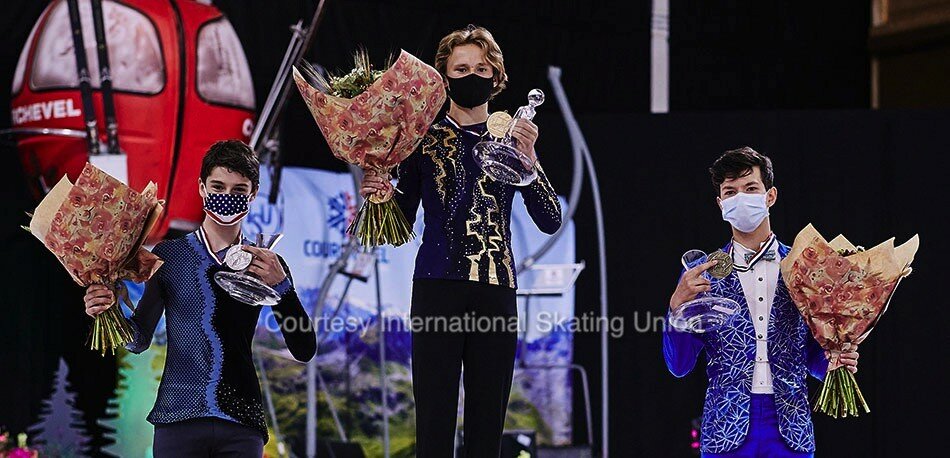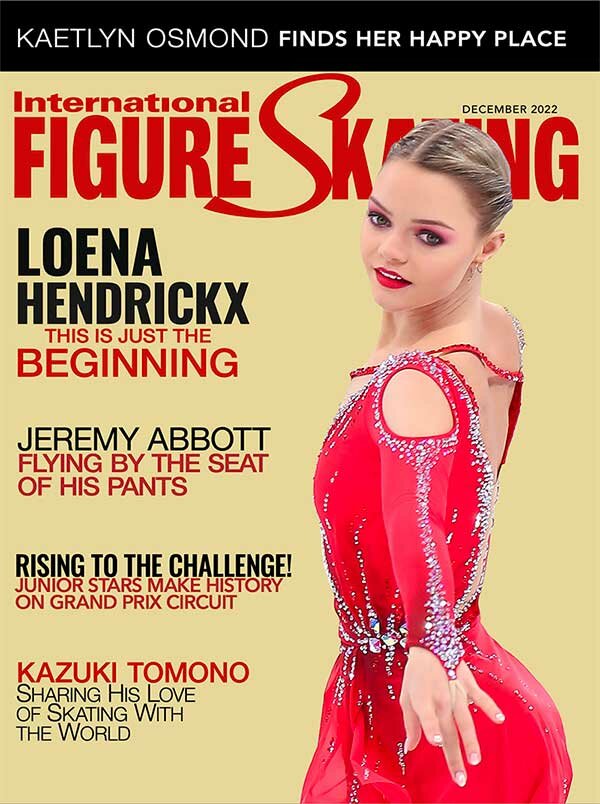

Two years had passed since the rising stars of the sport last showcased their talents on a Junior Grand Prix stage. So it was with much anticipation that the skating world welcomed the first competition of 2021, which took place in Courchevel, France. Due to restrictions imposed by the French government, the Russian team was unable to cross that nation’s borders to compete at this event. The Japanese federation had previously advised it would not be fielding any skaters to the first three competitions.
That scenario set the stage for a new generation of young skaters from other countries to battle it out for top honors. In the end, the Americans proved dominant, sweeping the top step of the trio of podiums. For all three gold medalists, it was the first victory on the junior circuit.
It was expected that Ilia Malinin of the U.S. would be the top contender at this competition and he did not disappoint, opening his quest for gold by winning the short program by a comfortable 3.44-point margin. Malinin earned positive GOEs across the board for his clean performance set to David Cook’s rendition of “Billie Jean.” However, the free skate (“Nobody Knows” by Autograf and “Golden Age” by Woodkid) was a challenge as he struggled to find his groove. Malinin opened the program by doubling a planned quad toe, which he landed on two feet, fell on the next jump (a quad Salchow) and stepped out of the subsequent triple Axel.
But the 16-year-old, who is coached by his parents, Tatiana Malinina and Roman Skorniakov, stepped up his game following those errors and moved through the routine making no further mistakes. “I definitely know that I didn’t to my best, but it happens to everyone,” said Malinin who claimed the gold with 214.64 points in total. “I think I probably rushed it a little bit. If I had taken my time a bit more I would have landed those quads. I am definitely happy that I finally won a Junior Grand Prix, especially the first one because I am here to support Team USA and it means a lot that I won it for them.
“It’s been a struggle since I haven’t competed in a year, but I think now that I’m back and things are starting to go back to normal, I hope in the future I’ll do better than I did today.”
His teammate Lucas Broussard, who is coached by Darin Hosier and Corrie Martin in Seattle, Washington, sat in third following the short program, but a solid performance in the free moved him into second place overall. He captured the silver medal in his international debut with 192.31 points.
Francois Pitot of France sat in fourth after the short but skated well enough in the free to move up and capture the bronze medal with a score of 182.26. It was a quantum leap from his 12th place finish at this event in 2019. His reaction to his result in the kiss and cry was medal-worthy in itself. Pitot is coached by four-time French champion Florent Amodio.
Canada’s Corey Circelli sat in second following a solid short program, but technical errors in the free left him in sixth in the segment and he finished in fourth-place overall with 182.15 points. It was a disappointing result for Circelli who missed the third step of the podium by just 0.11 of a point.
The battle in the women’s competition began in the short with a trio of North American skaters taking the top three spots.
After failing to make the cut for the free skate at the 2020 World Junior Championships, Lindsay Thorngren of the U.S. spent the past year improving her skating skills, technique and performance aspects. That work ultimately paid off in Courchevel. Second after the short, Thorngren sailed through her long program set to Queen’s Gambit by Cédric Tours, nailing six clean triple jumps. Her only mistake was an edge call on a triple flip.
The 15-year-old, who is coached by former Austrian champion Julia Lautowa, closed out the competition with 181.45 points to capture her first medal on the junior circuit. “I am so happy to have won gold,” Thorngren said. “I want to work hard to become better. In the past year I worked to become a better skater. Since there were no competitions, I worked more on building my skills and my jumps.”
Kaiya Ruiter of Canada also had something to prove, as she too failed to make the cut for the free at the 2020 World Junior Championships. Coached by two-time U.S. champion Scott Davis and Canada’s Jeffrey Langdon, the 15-year old finished third in the short program. Skating to “Loyal Brave True” from the “Mulan” soundtrack (choreographed by David Wilson) in the free, Ruiter laid down a clean performance that included five triples. Her final tally of 177.60 moved her up one spot to finish second overall.
“I’m so excited. Just to come here to Courchevel and perform in front of a live crowd was really special,” said Ruiter. “The (long) program is about strength and determination. I just wanted to go out there and skate a personal best and give everything I have. I enjoyed the whole thing, from the second I got on the ice to the second I got off.”
Clare Seo of the U.S. won the short program but finished third in the final standings with 174.80 points. Seo, who formerly represented South Korea and is the 2020 national junior champion, was hit with a number of under-rotations, an edge call and q on the triple loop in the free. The 14-year old Pomono, California native is coached by Tammy Gambill and Hyemin Kim in Colorado Springs.
It was no contest in the ice dance discipline for Katarina Wolfkostin and Jeffrey Chen of the U.S. who scored a runaway victory in their first outing of the season. The reigning junior national champions, who are coached by Igor Shpilband and Pasquale Camerlengo in Novi, Michigan, took the lead following a solid rhythm dance performance set to a medley of Michael Jackson tunes, which earned a score of 64.75 and gave them a 7.34-point lead.
Performing to “Rain, In Your Black Eyes” by Ezio Bosso, Wolfkostin and Chen earned Level 4s for three elements — the opening spin, the rotational/stationary combination lift and the twizzles. The final tally of 165.01 assured them their first win on the junior circuit by a 15.62-point margin.
“For the most part, it feels really great that we were able to put out what we wanted to on the ice today. We had a little bit more time to dive down and work on the basic elements and our synergy and energy together,” said Wolfkostin with respect to having no opportunity to compete for more than a year.
“Especially after such a long time without competitions coming out here and doing what we did feels really good,” added Chen. “It felt like a very slow, almost non-existent season (last year). Most of the competitions were either online or just canceled, so it felt really good to come back to competition.” (Chen is the younger brother of Karen Chen). The team has been assigned to the fifth Junior Grand Prix, which takes place in Ljubljana, Slovenia, Sep. 22-25.
Canada’s Miku Makita and Tyler Gunara finished second with 149.39 points. Coached by Aaron Lowe and Megan Wing, the duo showed a lively performance in the free dance set to “Tangosain” and “Adios Nonino” by Astor Piazzolla. Though the team was slightly disappointed with the rhythm dance score, they were upbeat at the end of the competition. “We came back in the long and did what we wanted to do,’’ said Makita. ‘’We trained really hard to be well prepared to deal with the altitude here.’’
“It was weird competing again after a year and half and having judges on the panel and people watching you,’’ Gunara added.
South Korea’s Hannah Lim and Ye Quan who train at the I.AM Academy in Montréal, Canada, finished third with 144.27 points, writing their own little piece of history as the first ice dance team from their nation to capture a medal on the Junior Grand Prix circuit.




